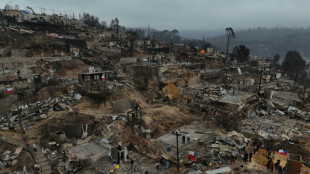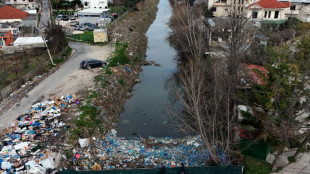
-
 Bangladesh launches campaigns for first post-Hasina elections
Bangladesh launches campaigns for first post-Hasina elections
-
Afghan resistance museum gets revamp under Taliban rule

-
 Multiple people missing in New Zealand landslips
Multiple people missing in New Zealand landslips
-
Sundance Film Festival hits Utah, one last time

-
 Philippines convicts journalist on terror charge called 'absurd'
Philippines convicts journalist on terror charge called 'absurd'
-
Anisimova grinds down Siniakova in 'crazy' Australian Open clash

-
 Djokovic rolls into Melbourne third round, Keys defence alive
Djokovic rolls into Melbourne third round, Keys defence alive
-
Vine, Narvaez take control after dominant Tour Down Under stage win

-
 Chile police arrest suspect over deadly wildfires
Chile police arrest suspect over deadly wildfires
-
Djokovic eases into Melbourne third round - with help from a tree

-
 Keys draws on champion mindset to make Australian Open third round
Keys draws on champion mindset to make Australian Open third round
-
Knicks halt losing streak with record 120-66 thrashing of Nets

-
 Philippine President Marcos hit with impeachment complaint
Philippine President Marcos hit with impeachment complaint
-
Trump to unveil 'Board of Peace' at Davos after Greenland backtrack

-
 Bitter-sweet as Pegula crushes doubles partner at Australian Open
Bitter-sweet as Pegula crushes doubles partner at Australian Open
-
Hong Kong starts security trial of Tiananmen vigil organisers

-
 Keys into Melbourne third round with Sinner, Djokovic primed
Keys into Melbourne third round with Sinner, Djokovic primed
-
Bangladesh launches campaigns for first post-Hasina polls

-
 Stocks track Wall St rally as Trump cools tariff threats in Davos
Stocks track Wall St rally as Trump cools tariff threats in Davos
-
South Korea's economy grew just 1% in 2025, lowest in five years

-
 Snowboard champ Hirano suffers fractures ahead of Olympics
Snowboard champ Hirano suffers fractures ahead of Olympics
-
'They poisoned us': grappling with deadly impact of nuclear testing

-
 Keys blows hot and cold before making Australian Open third round
Keys blows hot and cold before making Australian Open third round
-
Philippine journalist found guilty of terror financing

-
 Greenlanders doubtful over Trump resolution
Greenlanders doubtful over Trump resolution
-
Real Madrid top football rich list as Liverpool surge

-
 'One Battle After Another,' 'Sinners' tipped to top Oscar noms
'One Battle After Another,' 'Sinners' tipped to top Oscar noms
-
Higher heating costs add to US affordability crunch

-
 Eight stadiums to host 2027 Rugby World Cup matches in Australia
Eight stadiums to host 2027 Rugby World Cup matches in Australia
-
Plastics everywhere, and the myth that made it possible

-
 Interim Venezuela leader to visit US
Interim Venezuela leader to visit US
-
Australia holds day of mourning for Bondi Beach shooting victims

-
 Liverpool cruise as Bayern reach Champions League last 16
Liverpool cruise as Bayern reach Champions League last 16
-
Fermin Lopez brace leads Barca to win at Slavia Prague

-
 Newcastle pounce on PSV errors to boost Champions League last-16 bid
Newcastle pounce on PSV errors to boost Champions League last-16 bid
-
Fermin Lopez brace hands Barca win at Slavia Prague

-
 Kane double fires Bayern into Champions League last 16
Kane double fires Bayern into Champions League last 16
-
Newcastle pounce on PSV errors to close in on Champions League last 16

-
 In Davos speech, Trump repeatedly refers to Greenland as 'Iceland'
In Davos speech, Trump repeatedly refers to Greenland as 'Iceland'
-
Liverpool see off Marseille to close on Champions League last 16

-
 Caicedo strikes late as Chelsea end Pafos resistance
Caicedo strikes late as Chelsea end Pafos resistance
-
US Republicans begin push to hold Clintons in contempt over Epstein

-
 Trump says agreed 'framework' for US deal over Greenland
Trump says agreed 'framework' for US deal over Greenland
-
Algeria's Zidane and Belghali banned over Nigeria AFCON scuffle

-
 Iran says 3,117 killed during protests, activists fear 'far higher' toll
Iran says 3,117 killed during protests, activists fear 'far higher' toll
-
Atletico frustrated in Champions League draw at Galatasaray

-
 Israel says struck Syria-Lebanon border crossings used by Hezbollah
Israel says struck Syria-Lebanon border crossings used by Hezbollah
-
Snapchat settles to avoid social media addiction trial

-
 'Extreme cold': Winter storm forecast to slam huge expanse of US
'Extreme cold': Winter storm forecast to slam huge expanse of US
-
Jonathan Anderson reimagines aristocrats in second Dior Homme collection


Price of victory: How Allied D-Day bombs killed French civilians
As the World War II victors celebrate the anniversary of the June 6, 1944, landings in Normandy, historians recall that 3,000 French civilians died under Allied bombs that day.
In an attempt to cut off German reinforcements rushing to the coast in response to the Allied invasion, American and British aircraft dropped bombs on main roads in several towns, including Caen, where the population believed -- in error as it turned out -- that it was safe to stay put during the raging battle on the coast.
"We saw bombs drop on Caen constantly," said Fernande Mignon, 93.
"My mother persuaded my father to let us seek shelter in the quarries," she told AFP at her home in Fleury-sur-Orne just outside Caen and close to where she grew up.
The move probably saved their lives.
Within 24 hours, 3,000 civilians had died in the firestorm unleashed by 1,500 bombers, including 700 in the town of Lisieux alone.
The number is comparable with the more than 4,600 Allied military personnel killed on D-Day, according to Commonwealth War Graves Commission figures.
Allied bombing missions reduced most town centres in lower Normandy to rubble.
After 10 weeks, the number of people who died in their homes in the area totalled 14,000.
- 'Bridgehead needed to hold' -
"If the landings were to succeed, the bridgehead needed to hold for 48 to 72 hours," said Emmanuel Thiebot, a historian and director of a memorial site dedicated to civilians in wartime.
"German reinforcements had to be slowed down for three days," he told AFP.
Main roads always ran through city centres at the time -- ring roads were to be introduced only after the war -- which put the hearts of towns and villages including Vire, Conde-sur-Noireau, Pont-L'Eveque, Flers and l'Aigle on the fire-bombing target list of the Allied command.
Residents often stepped outside their homes to watch the planes approach, assuming that they were simply flying overhead to destinations further inland, historians Francoise Passera and Jean Quellien said in a 2014 book.
But then, to the dismay of the civilians, the bomb bay doors opened over their heads and the explosives dropped.
"There was a massive tremor. We held each other, thinking that we were done for," the historians quoted a 15-year-old eyewitness as saying.
The teenage girl got away "by following mum's and dad's vague silhouettes in the blinding thick dust", she said.
People exited their homes with blood streaming down their faces.
Some were buried alive in the rubble, while others were decapitated by shell fragments.
- 'Not very efficient' -
With hindsight, the strategic wisdom of targeting city centres was actually debatable, said Thiebot.
"The tactic was not very efficient in military terms -- far from it -- because the Germans kept clear of the major roads," he said.
In fact, German reinforcements made it to the front line as early as the evening of June 6, with even more arriving the following day.
An earlier attempt by the Allies to get people to evacuate the area ahead of the assault came to little.
Pamphlets air-dropped three months before D-Day urging residents to leave "immediately" because the area "would come under attack very soon" were mostly ignored or lost in fields, unread.
Mignon ended up spending six weeks in the shelter of the quarry, sleeping on straw and living off "whatever we could find", while relentless bombing continued out in the open.
Eventually, on July 19, a Canadian arrived, telling them in Quebec-accented French that the fighting was over.
"Everybody exploded with joy," she said.
But the initial happiness quickly turned to consternation as the family discovered the destruction wrought on their neighbourhood and everything around it.
At the family home, "the windows were broken, doors were unhinged and rain was falling into the house", she recalled.
It was to take "several years" before Mignon and her family managed to get back to a "normal life", she said.
R.Kloeti--VB



